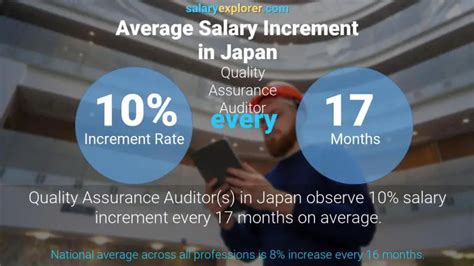Japan's economy, the fourth-largest in the world, offers a unique and dynamic environment for professionals seeking to advance their careers. With its blend of technological innovation, rich cultural heritage, and global business leadership, Japan presents compelling opportunities. But what can you expect to earn? While the national average salary provides a benchmark, your actual earnings can vary significantly based on your industry, experience, and location.
This guide will break down the average salary in Japan, explore the key factors that influence compensation, and provide a realistic outlook on the current job market.
What is the Japanese Salary Landscape?

Before diving into the numbers, it's crucial to understand the structure of compensation in Japan. Unlike the salary structures in many Western countries, a Japanese salary package often consists of several components:
- A Monthly Base Salary (基本給, *kihonkyū*): This is your fixed monthly pay.
- Allowances: These can include transportation stipends, housing support, and family allowances.
- Bonuses: A significant part of total compensation in Japan. Most full-time employees receive bonuses twice a year (summer and winter), which can equal anywhere from two to six months of their base salary, depending on company and individual performance.
When you see an "average annual salary," it typically includes these regular bonuses. This is a critical distinction, as the monthly take-home pay might seem lower until these substantial bonus periods are factored in.
The Average Salary in Japan: The Numbers

Determining a single "average" salary can be complex, as different sources use different methodologies. However, by looking at data from government and reputable global organizations, we can establish a clear picture.
According to the Organisation for Economic Co-operation and Development (OECD), the average annual wage in Japan is $41,509 USD as of its latest 2022 data.
Data from within Japan provides a more granular view. Japan's National Tax Agency, in its 2022 survey, reported the average annual salary for private-sector workers to be ¥4.58 million. At a typical exchange rate (e.g., ~150 JPY to 1 USD), this is approximately $30,500 USD. The difference between the OECD and domestic figures often lies in methodologies and purchasing power parity adjustments.
For a practical salary range, we can look at data from salary aggregators:
- Payscale reports an average base salary of ¥4.99 million per year.
- Entry-level positions often start around ¥3 million annually.
- Highly experienced senior professionals, especially in high-demand fields, can earn well over ¥10 million.
In summary: A realistic expected salary range for a professional in Japan is between ¥4 million and ¥7 million, with significant potential for higher earnings based on the factors below.
Key Factors That Influence Salary

Your personal earning potential is a story told by several key factors. In Japan, these variables have a particularly strong and well-defined impact on compensation.
### Years of Experience
Japan's professional culture has traditionally valued seniority. The system of *nenkō joretsu* (年功序列), or seniority-based wages, means that salary tends to increase steadily with years of service at a single company. While this system is becoming more flexible, experience remains the most significant factor in determining salary.
- New Graduate / Entry-Level (0-2 years): Typically earn between ¥3 million and ¥4 million. The primary focus is on training and integration into the company culture.
- Mid-Career Professional (3-10 years): With proven skills and experience, salaries rise to the ¥4.5 million to ¥8 million range. This is where specialized skills begin to command a premium.
- Senior / Management (10+ years): Senior managers, directors, and specialists with extensive experience can expect to earn ¥8 million to ¥15 million+, with executive-level compensation being significantly higher.
### Geographic Location
Where you work in Japan has a substantial impact on your salary and cost of living. The Kanto region, home to Tokyo, is the country's economic powerhouse and offers the highest salaries.
- Tokyo: As the center of business and finance, salaries here are the highest in the nation, often 10-25% above the national average.
- Kanagawa and Osaka: These prefectures, also major economic hubs, offer competitive salaries that are slightly lower than Tokyo's but still well above the national average.
- Other Regions (e.g., Fukuoka, Hokkaido, Okinawa): While offering a lower cost of living and excellent quality of life, salaries in these regions are generally lower than in the major metropolitan areas.
### Industry and Job Function
The industry you work in is a primary driver of your earning potential. High-growth and high-value sectors consistently offer better compensation.
- IT & Technology: This is a high-demand sector due to Japan's digital transformation push. Roles like Software Engineer, Data Scientist, and Cybersecurity Analyst often command salaries from ¥6 million to ¥12 million+.
- Finance & Banking: Professionals in investment banking, asset management, and financial analysis are among the highest earners, with salaries frequently exceeding ¥10 million.
- Consulting: Strategic and management consultants are highly compensated for their expertise, with typical salaries ranging from ¥7 million to ¥20 million depending on the firm and seniority.
- Manufacturing & Engineering: As a cornerstone of Japan's economy, experienced engineers in automotive, robotics, and electronics can earn between ¥5 million and ¥9 million.
- Healthcare & Pharmaceuticals: Doctors, medical specialists, and researchers in pharmaceuticals earn premium salaries, often in the ¥8 million to ¥18 million range.
### Company Type
The type of company you work for is another critical factor.
- Large Domestic Corporations (大手企業, *Ōte kigyō*): Companies like Toyota, Sony, and Mitsubishi offer high stability, excellent benefits, and competitive salaries that follow a traditional seniority structure.
- Small and Medium-sized Enterprises (SMEs): These companies make up the backbone of Japan's economy but generally offer lower salaries and less comprehensive benefits than their larger counterparts.
- Foreign-Affiliated Companies (外資系企業, *Gaishikei*): International companies operating in Japan often pay a premium for bilingual talent and specialized skills. Their compensation structures are typically more performance-based and can offer higher base salaries and bonuses, particularly in sales, tech, and finance.
### Level of Education
A university degree is a standard requirement for most professional, full-time (*seishain*) positions in Japan. While not as heavily weighted as experience, the prestige of the university you graduated from can influence your starting salary and career opportunities, especially when applying to top-tier domestic firms. Advanced degrees (Master's, Ph.D.) can provide a significant advantage in specialized R&D, finance, and technology roles.
Job Outlook

It's important to note that the U.S. Bureau of Labor Statistics (BLS) exclusively covers the job market within the United States. For Japan, we turn to domestic and international sources.
The job outlook in Japan is shaped by a unique demographic challenge: a rapidly aging and declining population. This has created a persistent labor shortage, resulting in a high "jobs-to-applicants ratio." According to Japan's Ministry of Health, Labour and Welfare, this ratio consistently remains above 1.0, indicating there are more open jobs than people seeking them.
This environment creates significant opportunities, especially for:
- Skilled foreign professionals: The Japanese government is actively working to attract global talent to fill critical skills gaps.
- Workers in high-demand fields: IT, software development, digital marketing, green technology, and advanced healthcare are all experiencing robust growth.
Professionals with the right skills, particularly those who are bilingual in Japanese and English, will find themselves in a strong negotiating position in the current and future job market.
Conclusion

Pursuing a career in Japan offers a path to working within a global economic powerhouse renowned for its innovation and quality. While the average national salary of around ¥4.58 million (approx. $30,500 USD) provides a useful starting point, it is only part of the story.
Your true earning potential will be defined by your years of experience, your industry, your ability to secure a position in a major city like Tokyo, and the type of company you join. For ambitious professionals with in-demand skills, especially in technology and finance, the opportunities for career growth and high compensation are significant. By understanding these key factors, you can strategically navigate the Japanese job market and build a rewarding and prosperous career.
